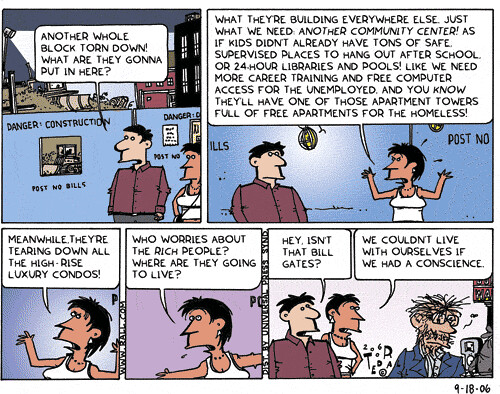Comprehensive planning and local planning: ain't no easy job

This piece, "An Appreciation: Charles M. Haar, Leading Advocate for Comprehensive Planning, Dies at 91," from the California Planning & Development Report, provides an overview and discussion of his work.
This helps provide some perspective on the takeout about Harriet Tregoning, DC's Director of the Office of Planning, "Urbanista! Inside Harriet Tregoning's Push to Reshape D.C." (and this related piece, "A Few Other Tregoning Bits") from the Washington City Paper.
I love talking planning theory and practice with Harriet Tregoning, but it is fair to say that the relatively pro-urban policies and practices that DC is executing--with fits and starts and so damn many fumbles--started with Mayor Williams.
It would be extremely impolitic for me to "disclose" my reaction to the story, although she is certainly a lot more politic than her peer in Montgomery County.
He has little patience with dissenters. Stanley goes so far as to accuse them of being “rich, white women…spreading fear.” He says they stalk his appearances before community groups, sowing discord. He claims they refer to themselves as “the coven.”.
And in terms of longevity, she is working out a lot better than Peter Katz has in Arlington County--maybe Peter's "problem" is more like mine, more a focus on the long term and planning theory as much as practice, when most people are focused on the here and now. See "Arlington's heralded planning director resigns" from the Washington Post. (Note that I think it would be very difficult to have a planning director's job where your boss, Robert Brosnan, had been the director of the office previously--for a couple decades.)
I will say this: despite the fact that DC is one of the nation's first truly planned cities, it's very tough to run "planning" in this city (or any other place for that matter, e.g., the director of the Office of Planning in Baltimore County was canned by the new county executive, scotching any chance I had for a permanent job there...) for a number of reasons:
• the tension between the federal city and the local as it relates to planning (this is a DC-exclusive issue, all the others recounted below are universal problems for the most part);
• the fact that the "Growth Machine" runs the show and political and economic elites are united and favor a land use development agenda focused on intensification of land use--these economic elites provide the bulk of the financial support for candidates for office as well;
• note that for the most part, private real estate development is what executes and implements change, while plans and zoning regulations guide the change, they are not prescriptive in every detail;
• my sense that most elected officials don't really consider the long term impacts of what they do concerning land use planning and urban design and placemaking especially--they are focused so much on the here and now, what can be done this minute, and so they rarely consider the cumulative impact of what they do and the abject s*** that they enable;
• speaking of the "here and now" orientation of elected officials, because of this, they seem to not be too clued into the value and necessity of planning generally;
• the fact of the matter is that elected officials, the Executive (Mayor/County Executive) set the policy and tone and parameters of what government agency directors and staff can do, and for the most part agency directors and staff find that their "span of control" is extremely constrained--in other words, at the end of the day, they do what they are told to do;
• the fact that residents for the most part are focused on minimizing change to the neighborhoods, not caring very much about the long term position of the city, and working to balance short term and long term considerations, and certainly not understanding of the constraints that planning agencies work within;
• the fact that most "Americans" are imprinted by a suburban-oriented land use planning paradigm that prioritizes separation of use and the private automobile, so even when they move to the city they mostly apply suburban-appropriate ideas to decidedly urban issues.
Plus the one thing that Clarence Haar didn't get "changed" in the law concerned the degree of legal force possessed by comprehensive/master plans.
Comprehensive plans are considered precatory law: guidance only, not absolute requirements; whereas zoning regulations have the full force of law and are specific requirements, albeit with provisions for change (exceptions, variances, zoning changes--"text" and "map" amendments).

Ted Rall editorial cartoon, 9/18/2006.
Labels: electoral politics and influence, Growth Machine, land use planning, provision of public services, real estate development, zoning



0 Comments:
Post a Comment
<< Home